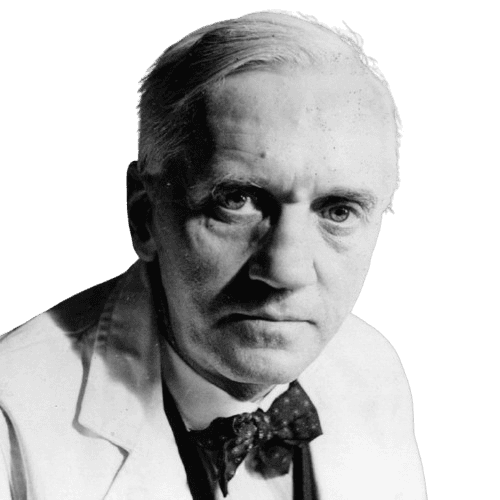Life and achievements
Early life
Alexander Fleming was born to a farming family on August 6, 1881, in Darvel, Ayrshire, Scotland. His childhood on a farm made him very wise and fond of nature. Fleming's father died when he was seven, and the family was not very well off, yet he could attend Loudoun Moor School and then Darvel School. He got a scholarship to attend Kilmarnock Academy and did very well academically there.
Fleming joined his elder brother Thomas, an oculist, in London at 13. He studied at the Royal Polytechnic Institution and then got a job at a shipping office, where he worked for four years. A small amount of money from his uncles will support his desire to become a doctor. He joined St. Mary's Hospital Medical School in Paddington in 1903 and graduated with an MBBS in 1906 with distinction.
Fleming's initial professional experience was associated with his work under Sir Almroth Wright, a leading immunologist and specialist in vaccine therapy. This mentorship was crucial for forming Fleming's scientific outlook and the discoveries he would make in bacteriology.
Legacy
Alexander Fleming's contribution to society is mainly associated with his discovery of Penicillin, which changed the course of medicine. Penicillin has been used to treat millions of patients since its discovery, and this can be seen as the start of the antibiotic age. The work of Fleming is considered the beginning of the antibiotics that helped to decrease the death rate due to bacterial infections and opened new possibilities in the sphere of medicine.
Fleming contributed to the scientific discoveries and emphasized the proper usage of the discovered antibiotics to avoid the development of resistance. His messages on the risks of antibiotic abuse are still timely, given the current threat of antibiotic resistance worldwide.
Fleming was recognized for his work and awarded many times, including the Nobel Prize in Physiology or Medicine in 1945, jointly with Howard Florey and Ernst Boris Chain. He was knighted by King George VI in 1944 and conferred with the degree of Doctor of Laws by almost thirty universities. He became one of the most significant personalities in the history of medicine due to the discovery of Penicillin, which was acknowledged by Time magazine and the BBC.
Fleming's legacy is carried on through establishments named after him. These include the Alexander Fleming Laboratory Museum at St. Mary's Hospital and other learning institutions. He and his work can inspire every scientist and doctor engaged in developing healthcare and the fight against infectious diseases.
Milestone moments
Aug 6, 1881
Alexander Fleming's Birthday
Alexander Fleming was born on August 6, 1881, on a farm known as Lochfield Farm in Darvel, Ayrshire in Scotland.
His parents were Hugh Fleming, a farmer, and Grace Stirling Morton.
Fleming spent his early childhood on a farm, and the environment contributed to his natural ability to observe and his appreciation for nature.
Mar 13, 1903
He joins St. Mary's Hospital Medical School
Fleming started his medical education in 1903 at the St. Mary's Hospital Medical School in Paddington.
His elder brother Tom, who was already a physician, encouraged him.
Fleming was an outstanding student and received his MBBS degree in 1906 with distinction.
Jul 5, 1922
Discovery of Lysozyme
In 1922, Fleming identified lysozyme, an enzyme that has antibacterial properties.
This discovery was made when he was observing his nasal secretions under the microscope for some reason.
Lysozyme was the first of Fleming's significant discoveries in bacteriology.
Sep 5, 1928
Discovery of Penicillin
Fleming discovered Penicillin in September of 1928.
He noted that mould had affected bacteria on a petri dish by killing them.
This was a chance finding that completely changed how bacterial infections are treated.
